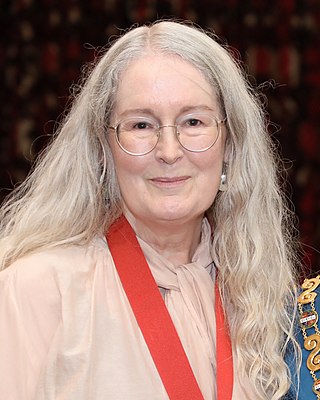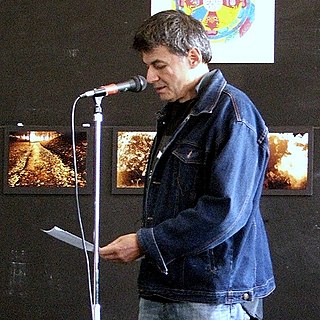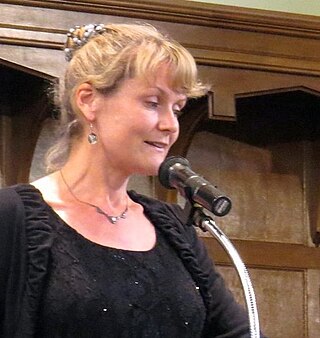Related Research Articles

New Zealand literature is literature, both oral and written, produced by the people of New Zealand. It often deals with New Zealand themes, people or places, is written predominantly in New Zealand English, and features Māori culture and the use of the Māori language. Before the arrival and settlement of Europeans in New Zealand in the 19th century, Māori culture had a strong oral tradition. Early European settlers wrote about their experiences travelling and exploring New Zealand. The concept of a "New Zealand literature", as distinct from English literature, did not originate until the 20th century, when authors began exploring themes of landscape, isolation, and the emerging New Zealand national identity. Māori writers became more prominent in the latter half of the 20th century, and Māori language and culture have become an increasingly important part of New Zealand literature.

James Keir Baxter was a New Zealand poet and playwright. He was also known as an activist for the preservation of Māori culture. He is one of New Zealand's most well-known and controversial literary figures. He was a prolific writer who produced numerous poems, plays and articles in his short life, and was regarded as the preeminent writer of his generation. He suffered from alcoholism until the late 1950s. He converted to Catholicism and established a controversial commune at Jerusalem, New Zealand, in 1969. He was married to writer Jacquie Sturm.
Alistair Te Ariki Campbell ONZM was a poet, playwright, and novelist. Born in the Cook Islands, he was the son of a Cook Island Māori mother and a Pākehā father, who both died when he was young, leading to him growing up in a New Zealand orphanage. He became a prolific poet and writer, with a lyrical and romantic style tempered by a darkness borne out of his difficult childhood and struggles with mental health as a young adult. Although he wrote about Māori culture from his earliest works, after a revelatory return to the Cook Islands in 1976, his later works increasingly featured Pasifika culture and themes. He received a number of notable awards during his lifetime including the New Zealand Book Award for Poetry and Prime Minister's Award for Literary Achievement, and is considered one of New Zealand's foremost poets as well as a pioneer of Pasifika literature written in English.
Fleur Adcock is a New Zealand poet and editor, of English and Northern Irish ancestry, who has lived much of her life in England. She is well-represented in New Zealand poetry anthologies, was awarded an honorary doctorate of literature from Victoria University of Wellington, and was awarded an OBE in 1996 for her contribution to New Zealand literature. In 2008 she was made a Companion of the New Zealand Order of Merit, for services to literature.

William Manhire is a New Zealand poet, short story writer, emeritus professor, and New Zealand's inaugural Poet Laureate (1997–1998). He founded New Zealand's first creative writing course at Victoria University of Wellington in 1975, founded the International Institute of Modern Letters in 2001, and has been a strong promoter of New Zealand literature and poetry throughout his career. Many of New Zealand's leading writers graduated from his courses at Victoria. He has received many notable awards including a Prime Minister's Award for Literary Achievement in 2007 and an Arts Foundation Icon Award in 2018.

Jacqueline Cecilia Sturm was a New Zealand poet, short story writer and librarian. She was one of the first Māori women to complete an undergraduate university degree, at Victoria University College, followed by a Masters of Arts in Philosophy. She was also the first Māori writer to have her work published in an English anthology. Her short stories were published in several collections and student magazines in the 1950s and early 1960s, and in 1983 a women's publishing collective printed a collection of her short stories as The House of the Talking Cat. She continued to write short stories and poetry well into the early 2000s, and is regarded today as a pioneer of New Zealand literature.

Denis James Matthews Glover was a New Zealand poet and publisher. Born in Dunedin, he attended the University of Canterbury where he obtained a Bachelor of Arts, and subsequently lectured. He worked as a reporter and editor for a time, and in 1937 founded the Caxton Press, which published the works of many well-known New Zealand writers of the day. After a period of service in World War II, he and his friend Charles Brasch founded the literary magazine Landfall, which Caxton began publishing in 1947.

Brian Lindsay Turner is a New Zealand poet and author. He played hockey for New Zealand in the 1960s; senior cricket in Dunedin and Wellington; and was a veteran road cyclist of note. His mountaineering experience includes an ascent of a number of major peaks including Aoraki / Mount Cook.

Charles Orwell Brasch was a New Zealand poet, literary editor and arts patron. He was the founding editor of the literary journal Landfall, and through his 20 years of editing the journal, had a significant impact on the development of a literary and artistic culture in New Zealand. His poetry continues to be published in anthologies today, and he provided substantial philanthropic support to the arts in New Zealand, including by establishing the Robert Burns Fellowship, the Frances Hodgkins Fellowship and the Mozart Fellowship at the University of Otago, by providing financial support to New Zealand writers and artists during his lifetime, and by bequeathing his extensive collection of books and artwork in his will to the Hocken Library and the University of Otago.

Elizabeth Fiona Knox is a New Zealand writer. She has authored several novels for both adults and teenagers, autobiographical novellas, and a collection of essays. One of her best-known works is The Vintner's Luck (1998), which won several awards, has been published in ten languages, and was made into a film of the same name by Niki Caro in 2009. Knox is also known for her young adult literary fantasy series, Dreamhunter Duet. Her most recent novels are Mortal Fire and Wake, both published in 2013, and The Absolute Book, published in 2019.

Sir Vincent Gerard O'Sullivan is one of New Zealand's best-known writers. He is a poet, short story writer, novelist, playwright, critic, editor, biographer, and librettist.

Gregory Leo O’Brien is a New Zealand poet, painter, author and editor. He is also an art curator and writes art history and criticism for both adults and children.
Clifton Mark Williams is a New Zealand poet, writer, academic, critic, editor of contemporary New Zealand literature. He holds a MA (Hons) from the University of Auckland and a Ph.D (1983) from the University of British Columbia. He is emeritus Professor of English at Victoria University of Wellington.

David Eggleton is a New Zealand poet, critic and writer. Eggleton has been awarded the Ockham New Zealand Book Award for poetry and in 2019 was appointed New Zealand Poet Laureate, a title he held until 2022. Eggleton's work has appeared in a multitude of publications in New Zealand and he has released over 18 poetry books (1986–2001) with a variety of publishers, including Penguin.

Peter John Olds was a New Zealand poet from Dunedin. He was regarded as being a significant contributor within New Zealand literary circles, in particular, having an influence with younger poets in the 1970s. Olds held the University of Otago Robert Burns Fellowship and was the inaugural winner of the Janet Frame Literary Award. During the 1970s he spent time in the community of Jerusalem with James K Baxter.

Emma Neale is a novelist and poet from New Zealand.

David Howard is a New Zealand poet, writer and editor. His works have been widely published and translated into a variety of European languages. Howard was the co-founder of the literary magazine takahē in 1989 and the Canterbury Poets Collective in 1990. In New Zealand he held the Robert Burns Fellowship at the University of Otago in Dunedin in 2013, the Otago Wallace Residency, in Auckland in 2014, and the Ursula Bethell Residency in Christchurch, in 2016. In more recent years he has been the recipient of a number of UNESCO City of Literature Residencies.
Owen Leeming is a New Zealand poet, playwright, radio presenter and television producer. While working in broadcasting in London and New Zealand in the 1950s and 1960s, he had short stories and poems published in various magazines and journals, and wrote stage and radio plays. In 1970 he was the first recipient of one of New Zealand's foremost literary awards, the Katherine Mansfield Menton Fellowship, after which he published his first collection of poetry. Later in life he settled in France and became a translator. His second collection of poetry was published in 2018, over four decades after his first collection, followed by a collection of selected works in 2021.
David Mitchell was a New Zealand poet, teacher and cricketer. In the 1960s and 1970s he was a well-known performance poet in New Zealand, and in 1980 he founded the weekly event "Poetry Live" which continues to run in Auckland as of 2021. His iconic poetry collection Pipe Dreams in Ponsonby (1972) sold well and was a critical success, and his poems have been included in several New Zealand anthologies and journals. A collection of his poems titled Steal Away Boy: Selected Poems of David Mitchell was published in 2010, shortly before his death.
Iain Malcolm Lonie was a British-born New Zealand poet and a historian of ancient Greek medicine. His academic career was spent between New Zealand, Australia and England. He read classics at the University of Cambridge, lectured at universities in both Australia and New Zealand, worked as a research fellow for the Wellcome Trust, and wrote a definitive textbook on the Hippocratic texts On Generation, On the Nature of the Child and Diseases IV.
References
- 1 2 "The Robert Burns Fellowship". University of Otago. Archived from the original on 26 January 2021. Retrieved 10 November 2020.
{{cite web}}: CS1 maint: bot: original URL status unknown (link) - 1 2 3 4 Wilson, Janet (2006). "Newton, John". In Robinson, Roger; Wattie, Nelson (eds.). The Oxford Companion to New Zealand Literature. Oxford University Press. doi:10.1093/acref/9780195583489.001.0001. ISBN 978-0-1917-3519-6. OCLC 865265749. Archived from the original on 18 June 2023. Retrieved 8 November 2020.
- 1 2 "John Newton Products". Victoria University Press. Archived from the original on 4 June 2013. Retrieved 8 November 2020.
- 1 2 3 4 5 Fox, Rebecca (2 April 2020). "Creativity not constrained". Otago Daily Times. Archived from the original on 31 October 2020. Retrieved 8 November 2020.
- 1 2 "Sweetman Podcast: Episode 241 - John Newton". Soundcloud.com (Podcast). Off the Tracks. Retrieved 5 December 2020.
- ↑ Newton, John (1987). 'That's me trying to step out of that sentence' (Masters thesis). UC Research Repository, University of Canterbury. doi:10.26021/4653. hdl:10092/100678. Archived from the original on 27 March 2023.
- ↑ "Dr. John Newton". University of Canterbury. Archived from the original on 1 May 2009.
- ↑ Newton, John (1985). Tales from the Angler's Eldorado. Untold Publishing. ISBN 978-0-9597-7540-2.
- 1 2 3 "Fresh take for New Zealand literature". Waikato Times. 14 November 2013. Retrieved 8 November 2020.
- ↑ Sharp, Iain (December 1985). "Review of Tales from the Angler's Eldorado, by John Newton". Landfall. 39 (4): 528–531. Retrieved 8 November 2020.
- ↑ Evans, Miriam; McQueen, Harvey; Wedde, Ian, eds. (1989). The Penguin Book of Contemporary New Zealand Poetry. Penguin Books (NZ). ISBN 978-0-1405-8592-6.
- 1 2 Newton, John (2010). Lives of the Poets. Wellington, New Zealand: Victoria University Press. ISBN 978-0-8647-3628-4 . Retrieved 10 November 2020.
- ↑ Sharp, Iain (Autumn 2011). "Combing the romantic inheritance". New Zealand Review of Books (93). Retrieved 10 November 2020.
- ↑ Wyatt, Hamesh (14 August 2010). "Review special: Poetry". Otago Daily Times. Retrieved 10 November 2020.
- ↑ Newton, John (February 2013). Family Songbook. Wellington, New Zealand: Victoria University Press. ISBN 978-0-8647-3839-4 . Retrieved 10 November 2020.
- ↑ Eggleton, David (17 April 2013). "Songline chants". New Zealand Listener. Archived from the original on 28 May 2020. Retrieved 10 November 2020.
{{cite news}}: CS1 maint: bot: original URL status unknown (link) - ↑ Newton, John (October 2020). Escape Path Lighting. Wellington, New Zealand: Victoria University Press. ISBN 978-1-7765-6233-6 . Retrieved 10 November 2020.
- ↑ "Poet and academic John Newton new JD Stout Fellow". Scoop.co.nz. Victoria University of Wellington. 10 March 2010. Retrieved 8 November 2020.
- ↑ "Past John David Stout Research Fellows" (PDF). Victoria University of Wellington. Retrieved 8 November 2020.
- ↑ "UC appoints two Ursula Bethell Writers in Residence for 2017". University of Canterbury. 21 June 2017. Retrieved 8 November 2020.
- ↑ Newton, John (2009). The Double Rainbow: James K. Baxter, Ngāti Hau and the Jerusalem Commune. Wellington, New Zealand: Victoria University Press. ISBN 978-0-8647-3603-1 . Retrieved 9 November 2020.
- ↑ Dornauf, Peter (20 July 2009). "The rise and fall of a 'hippie commune'". Waikato Times. Retrieved 9 November 2020.
- ↑ Newton, John (2017). Hard Frost: Structures of Feeling in New Zealand Literature, 1908–1945. Wellington, New Zealand: Victoria University Press. ISBN 978-1-7765-6162-9 . Retrieved 10 November 2020.
- ↑ Roberts, Hugh (Spring 2018). "Unthawing". New Zealand Review of Books (123). Retrieved 10 November 2020.
- 1 2 Matthews, Philip (20 April 2019). "Baxter and rape: Now what?". Stuff.co.nz. Retrieved 10 November 2020.
- ↑ Newton, John (14 February 2019). "James K Baxter, rapist". The Spinoff. Retrieved 10 November 2020.
- ↑ Newton, John (2020). Llew Summers: Body and Soul. Christchurch, New Zealand: Canterbury University Press. ISBN 978-1-9885-0314-1.
- ↑ "A fresh look at Llew Summers' legacy". University of Canterbury. 27 July 2020. Retrieved 8 November 2020.
- ↑ Blundell, Sally (29 August 2020). "'An act of friendship': John Newton on the life and work of sculptor Llew Summers". The Spinoff. Retrieved 10 November 2020.
- 1 2 "Kiwi wordsmiths tuned up for musical gigs". Nelson Mail. 13 December 2013. Retrieved 6 December 2020.
- ↑ Gallety, Alice (29 July 2020). "Baxter author's back in business". The Dominion Post. Retrieved 6 December 2020.
- ↑ Programme: Saturday Morning (30 April 2011). "Playing (Country) Favourites with John Newton". RNZ. Retrieved 5 December 2020.
- ↑ Reid, Graham (6 March 2011). "The Tenderizers: Love Me Tender (Lefthand Gun)". Elsewhere. Retrieved 6 December 2020.
- ↑ Gruar, Tim (25 July 2011). "The Tenderizers/Love me Tender" . Retrieved 6 December 2020.
- ↑ Ross, Jack. "Experiments with sound". Jacket2 Notes on NZ Poetry. Retrieved 6 December 2020.
- ↑ Gig Guide (22 September 2014). "The Adulterators and guests". Undertheradar.co. nz. Retrieved 6 December 2020.